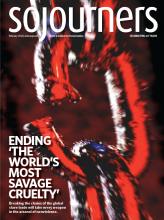AS ITS TITLE cleverly suggests, Liberating Biblical Study is a collection with several different aims. First, it seeks to model a way of reading the Bible deeply attuned to political questions, an approach free of uncritical piety on the one hand and intellectual obscurity on the other. Second, it attempts to display the vitality that biblical study can bring to movements for social change.
If there was ever a group that could pull off such feats, this is it. Movement-rooted biblical scholars Laurel Dykstra and Ched Myers gather here a diverse team of academics, activists, and artists, placing them in dialogue with one another on key biblical themes. Published in celebration of the opening of the Center and Library for the Bible and Social Justice (located in Stony Point, New York), these chapters bring scriptural imagination to bear on contemporary concerns such as economic equality, ecological restoration, and immigration—and they explore how such concerns have always been central in the struggle to be God’s people.
Among the contributions from biblical scholars, several stand out. Norman Gottwald, whose The Tribes of Yahweh introduced social theory into biblical studies in the late 1970s, here distills his thesis on the historical emergence of Israel as an indigenous revolutionary movement. Gale Yee examines how the theme of creation has been subordinated in Hebrew Bible scholarship and theologies of liberation and explores possibilities for its revival in the book of Hosea. Herman Waetjen, another pioneer of sociopolitical exegesis, sheds light on Matthew’s oft-misunderstood parable of the workers in the vineyard by attending to the economic realities of ancient Palestine. All demonstrate that how we read the Bible matters.
Read the Full Article
